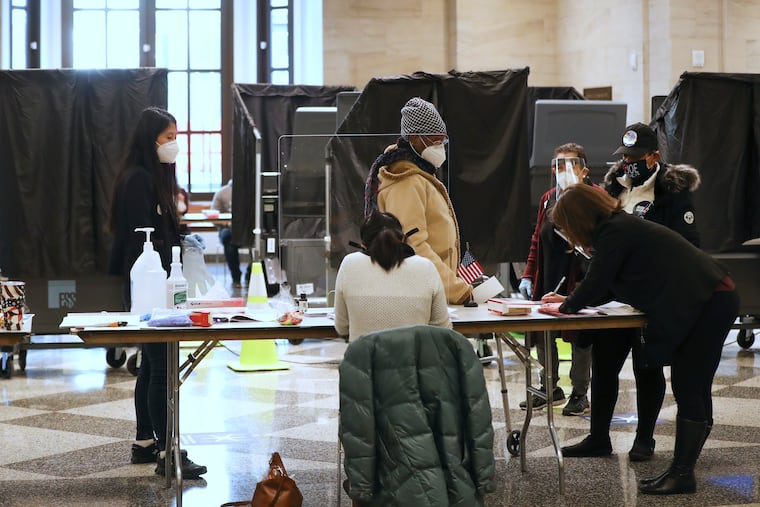Philly poll workers are about to get a raise
The thousands of poll workers on the ground Nov. 8 are poised to receive significantly more money than in the past.

Philadelphia is about to give raises to the people who run Election Day.
The thousands of poll workers on the ground Nov. 8 are poised to receive significantly more money than in the past for checking in voters, running voting machines, troubleshooting issues, and generally helping people cast their ballots.
The city commissioners, the office that runs elections, will vote Wednesday on a proposed poll worker pay raise:
Judges of elections, the head poll worker in each precinct, would receive $205, up from $120.
Other poll workers would receive $200, up from $115.
Bilingual interpreters would receive $180, up from $95.
Poll workers would receive $50 for attending training, up from $30, while bilingual interpreters would continue to receive $30.
Election Day is at least a 14-hour day for workers, who set up polling places before they open at 7 a.m. and pack up after they close at 8 p.m. That means the base pay has been only about $8.21 an hour.
“I was actually embarrassed to issue those checks at that low rate,” said Omar Sabir, the commissioner who will introduce the proposal Wednesday.
The two other elected commissioners, in separate interviews, said they support the move. Base pay for poll workers will then rise to $14.29 an hour.
Poll workers play a key role in elections
The city needs thousands of poll workers.
“Elections don’t happen without the people,” said Philadelphia elections chief Lisa Deeley, the chair of the commissioners. “Election Day in Philadelphia happens because of Philadelphians. Your neighbors, your coworkers, your family members take the time to go the polls at 6:30 in the morning, make sure the lights are on, make sure the tables are set up, the chairs, there’s paper towels in the ladies’ room, the machines are working.”
Philadelphia has 1,703 voting precincts, and each is supposed to have five workers: the judge of elections who runs the precinct, inspectors from both parties who help, a voting-machine inspector, and a clerk who checks voters in and manages lines. In addition, bilingual interpreters help voters with language needs.
Elections in Philadelphia were largely the same year to year. But the job has changed a lot in recent years, said Seth Bluestein, the sole Republican city commissioner.
Poll workers had to learn to use new voting machines beginning with the 2019 general election, expanded mail voting changed in-person procedures starting in 2020, voting during the pandemic has brought new challenges, and poll workers are being trained to use electronic poll books starting as early as next year.
» READ MORE: From 2020: People are volunteering to be poll workers in record numbers in Philly and the suburbs
It was already a lot of work, Bluestein said, and the pay should match.
“It’s just the right thing to do,” he said. “They work very long days, they have a lot of responsibility, and when we have the opportunity to compensate poll workers at a better rate, we should do that.”
We need more poll workers
Some of the poll-worker positions are supposed to be elected, while others are filled by appointment, and it’s meant to be a bipartisan effort. But in practice, elections offices across the country have faced poll-worker shortages for years, and hundreds of positions often went unfilled in Philly.
Then the pandemic hit. Poll workers are generally older voters, and the health risk of COVID-19 initially led to massive shortages in 2020. A surge in interest meant elections offices across the state were actually flooded with a surplus of workers that November, and some officials hoped that interest might last.
It didn’t.
In Philly, even fewer people ran for election as a poll worker in last year’s primary than in 2017. Most precincts didn’t have a single person who ran in the primary.
The commissioners hope interest in this year’s midterms will encourage more people to sign up — and offering more money might help. All three commissioners said they hoped young people in particular would sign up. Philly has a program to bring in high school students as poll workers.
“Hopefully with enough involvement and engagement with the schools, we’ll see more students step up,” Deeley said, “and hopefully fill those gaps on a regular basis in the same way we used to see our retirees do it.”
Philly can afford the pay raise now
While city elections officials have long supported hiking pay, they’ve also been constrained by chronic underfunding. And that’s only gotten worse in recent years, as the task of election administration has grown significantly.
For years, poll-worker pay stayed at about $100 a person. The commissioners in 2018 gave the first raise in decades, of $20 per worker.
They were able to use grant money in 2020 to give a one-time boost to poll-worker pay, but the pay rates fell back down after that.
» READ MORE: Philly elections chief pleads for more money as costs explode
Now the commissioners can afford a more substantive raise, they said, because of new state funding that’s giving the city about $5.4 million. While they and other elections officials across the state have concerns about conditions attached to the money, they are using some of it to fund the pay increases. The city also increased the elections budget this year.
“There is no guarantee that we will continue to get the same dollar amount of the grant,” Deeley said, “so suffice to say we’re going to have to cross that bridge when we get to it.”
Sabir said he’s proud to be able to provide the money to the poll workers.
“Far too often we see budgets receive additional resources and the little person never sees the impact,” he said. “And I’m glad that our everyday citizen that’s working hard is going to see the impact of our funding increase.”